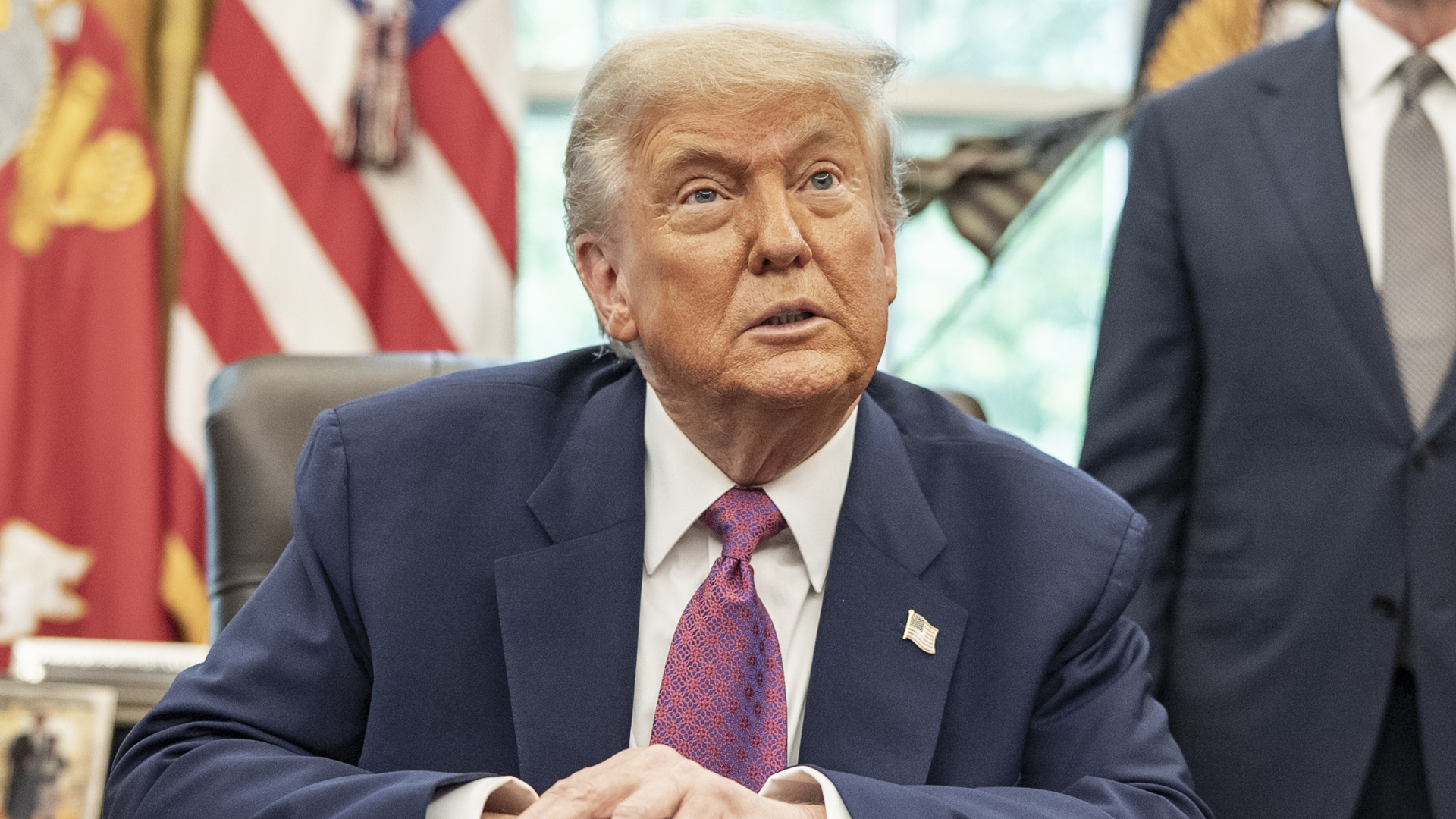
No one likes paying taxes. Maybe that’s why President Donald Trump has proposed nixing the income tax altogether in favor of tariffs. Tariffs, he believes, would make us so rich we could all kiss the tax man goodbye — at least the income tax man. Tariffs are basically a tax, paid by the importer, and passed onto the consumer.
Learn More: 5 Ways Trump’s ‘Big, Beautiful Bill’ Could Impact Your Wallet
Find Out: Mark Cuban Tells Americans To Stock Up on Consumables as Trump's Tariffs Hit -- Here's What To Buy
But what would things really look like if income taxes were a thing of the past? We asked ChatGPT. It had four main points.
Constitutional Viability
Could Trump put an end to income taxes by executive order or another unilateral way? That, said ChatGPT, is a hard no.
“Income taxes are codified in the 16th Amendment to the Constitution (1913), which explicitly authorizes the federal government to levy income taxes without apportioning them among the states,” it said. Abolishing income taxes would require legislation from Congress, with a two-thirds vote by both houses.
With that stated, it’s not likely to happen.
Read Next: 4 Ways Trump’s ‘Big Beautiful Bill’ Will Change How You Plan for Retirement
Budgetary Reality
The fact is, individual and corporate income taxes have made up the bulk of federal revenue for the past 50 years, according to the Bipartisan Policy Center. ChatGPT noted that equals $2.2 trillion in personal federal income tax, and $460 billion from corporate income tax, per 2023 figures. The Bipartisan Policy Center puts the figures at $2.4 trillion and $530 billion, respectively.
Either way, it’s a lot of money, with personal income taxes making up for 49% of total federal government revenue, and corporate income taxes making up 11%. Wipe them out, and the federal government loses 60% of its income.
Tariffs, on the other hand, bring in a mere $98 billion, according to ChatGPT — NPR put the figure for the fiscal year ending September of 2024 at $80 billion. Politico, which tracks the tariff income, reported that this year, U.S. tariffs, which include Trump’s tariffs, have brought in $100.5 billion as of July 13 — $53 billion more than at this time last year.
That is not going to cut it, according to ChatGPT: “Tariffs would need to be increased more than 20-fold to make up for the loss [in income tax].” It added that everything would have to be tariffed — all consumer goods, tech products, energy and industrial goods — at rates that would be inflationary and spark massive trade wars.
Economic and Social Impact
ChatGPT did throw some pros in with the cons. Hypothetically, it said, no federal income tax would make all our lives easier, simplifying the month of April.
Taxing spending — retail, tariffs, etc. — might also benefit some groups that spend little compared to their income, ChatGPT said. For instance, this would include high earners who are somewhat restrained in their spending and frugal retirees.
Now for the flip side. Tariffs and sales taxes are regressive, ChatGPT explained. It disproportionately hits low- and middle-income households who spend more of their income — as a percentage — than the wealthy. In other words, buying a book or computer or car is a larger percentage of income to someone making $50,000 a year than to someone making $5 million.
Additionally, because of the shortfall in federal revenue, massive budget cuts would be required. Large cuts to Medicaid and Medicare would be required — much larger than the ones in the One Big Beautiful Bill — in addition to the military and other entitlements and services.
So, Would We All Be Richer?
According to ChatGPT, that’s another hard no (in bold, no less). It claims that according to “almost all mainstream economists,” tariffs raise prices, reduce efficiency and can hurt job growth. In addition, ending the income tax would destabilize public finances and increase inequality. The move would benefit the wealthy and hurt the poor.
For his part, Trump believes that the period between 1870 to 1913, before income taxes were a thing and when tariffs were a very big thing, was America’s Golden Age. On April 15, he told Fox Noticias it was that era when we were our richest. That’s debatable at best, and very much depends on who you define as “we.” After all, Mark Twain coined it as the Gilded Age for its massive corruption and rampant inequality.
The wealthy were very wealthy, to be sure, but according to Digital History, supported by a consortium of government, university and public organizations, in 1877, the average annual income of an urban family was $738 ($22,594 in today’s money). After housing, food, heating and clothing, an average of $44 per year ($1,347) was left over for fun, emergencies and retirement savings — and without Social Security, they’d need it. For that, the average unskilled or semi-skilled person worked 10 hours a day for 20 cents ($6.12) per hour, and 939 out of 1,000 died with no property to pass on to heirs.
Frankly, that’s not sounding very golden.
More From GOBankingRates
- I'm a Realtor: This Is Why No One Wants To See Your Home
- 3 Things Retirees Should Stop Buying To Save Money Amid Tariffs
- Are You Rich or Middle Class? 8 Ways To Tell That Go Beyond Your Paycheck
- 9 Downsizing Tips for the Middle Class To Save on Monthly Expenses
This article originally appeared on GOBankingRates.com: I Asked ChatGPT What Would Happen if Trump Ended Income Taxes — There’s Good News and Bad News







